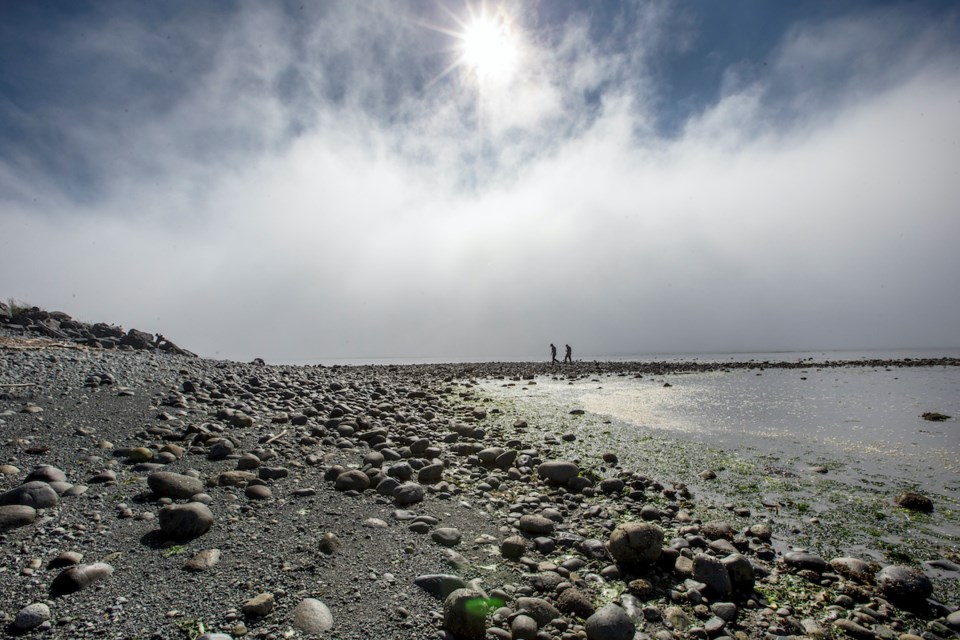Environment Canada has issued a heat warning for parts of coastal B.C., including east Vancouver Island and inland Vancouver Island, Squamish, Whistler and the Sunshine Coast.
Daytime highs of up to 34 C are forecast for Wednesday and Thursday.
Dr. Michael Schwandt, medical health officer with Vancouver Coastal Health and clinical assistant professor in the University of B.C. School of Population and Public Health, said it is important to consider the impact of heat on our health.
Signs to watch for
An Island Health alert about the heat notes that the signs of heat exhaustion include:
- heavy sweating
- severe headache
- muscle cramps
- extreme thirst and dark urine
"If you are experiencing these symptoms, you should seek a cooler environment, drink plenty of water, rest, use water to cool your body and monitor your symptoms," the health authority states.
Signs of heat stroke include:
- loss of consciousness
- disorientation
- confusion
- severe nausea or vomiting
- very dark urine or no urine
Heat stroke is a medical emergency.
Working in the heat
"We know that people who are working outdoors, during warm temperatures, can be at an increased risk for extreme heat illness, definitely,” Schwandt said.
"We advise both workers and employers to try to build in more frequent breaks into the day, to make sure that there's support for people to keep hydrated before — and not after — people start to feel hot and thirsty. Try to be proactive in that way, trying to provide shade or cooler spaces where possible — really trying to adapt the work as much as we can to avoid that prolonged heat exposure."
He added that in some cases, being alert to the impact of heat may mean postponing or adapting a job to keep workers safe.
Most importantly, if workers start to feel ill, it is vital to pay attention to that and act immediately to hydrate and cool off.
"It's not just a matter of discomfort, but potentially severe health outcomes," he said.
Athletes
Even very well-trained athletes can still be vulnerable to the effects of extreme heat, Schwandt said.
"It can often take people by surprise," he said.
He recommends that athletes avoid physical exertion during the hottest part of the day.
"If it's something that you might be able to do another day, it might be a good idea. Sometimes, it might just mean looking to do something a little bit earlier in the day than you might have otherwise."
Check on the vulnerable
A B.C. Coroners Service report found that of the 619 deaths reported in last year’s heat dome, half of those who died lived alone, and 67 per cent were 70 or older.
This happens, Schwandt said, because heat illness can progress very quickly.
If folks are starting to sweat heavily, feel nauseated, feel dizzy or have a headache, "that needs to be a clear signal from our body to change our activity," he said.
"Oftentimes, unfortunately, people might try to wait it out. And if they're not able to get to a pool or space or to cool down, the symptoms can move very quickly, especially if people have these medical vulnerabilities. It can often move from heat exhaustion to what we'd call heat stroke, or have an effect on different organs of the body, in very short order, unfortunately."
He recommends that folks check on each other during hot days to protect the community's most vulnerable.
Watch kids
Children are vulnerable to the effects of heat, too, Schwandt cautioned.
"With children, it's very important to monitor them closely because children are less likely to notice and less able to communicate if they have early symptoms of heat illness," he said.
And kids' symptoms can be different. "Typically, children will often become fussy, lethargic, potentially just appearing very tired," he said.
Schwandt noted that due to human-caused climate change, there will be more and more of these heat events.
He said the health system needs to adjust to this new reality, as do individuals and communities and governments.
Learn more about heat illness on Island Health's heat safety page.
— With a file from the Times Colonist



